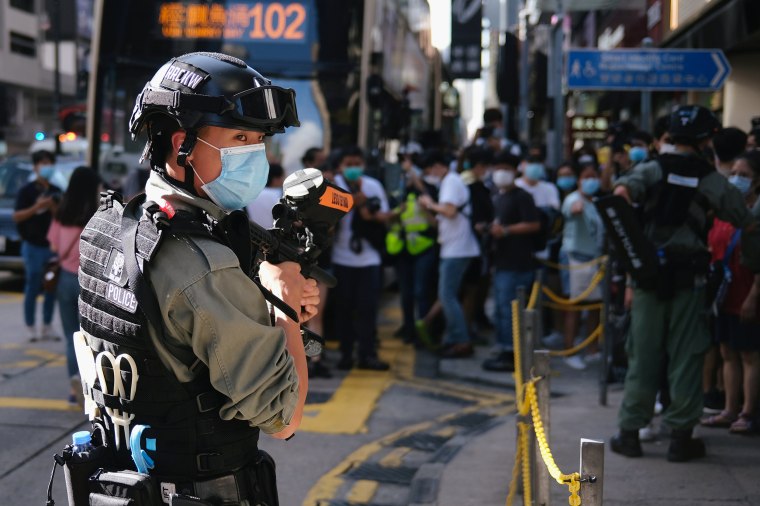HONG KONG — Beijing formally enacted security laws for Hong Kong on Tuesday, paving the way for one of the most profound changes to the governing of the territory in decades.
The bill was signed into law by China's President Xi Jinping and later formally adopted by Hong Kong Chief Executive Carrie Lam, according to state-run Xinhua news agency, bringing it into effect late Tuesday.
China stunned the world in May when it announced that it would side-step Hong Kong's own legislature and pass national security laws direct from Beijing.
The move is widely seen as a blow to the "one country, two systems" policy agreed between Britain and China in 1997 during the handover of the territory, which allowed Hong Kong to adopt a political system separate to the mainland.
"It's profoundly concerning and it's really the biggest crisis Hong Kong has faced in its modern history," said Benedict Rogers, co-founder of Hong Kong Watch, a British advocacy group that monitors Hong Kong's freedoms.
Rogers lived in the territory during the British handover and said the national security law's passage was "heartbreaking" and had "decimated" Hong Kong's autonomy.
"[It] could well mean the death of Hong Kong as we know it," he added.
The law — passed on the eve of the 23rd anniversary of Hong Kong's return to China — comes after pro-democracy demonstrations swept through the city last year. It will allow Beijing to set up special police units in Hong Kong to punish crimes considered a threat to the mainland, with some crimes carrying a maximum penalty of life in jail.
Officials in Beijing and Hong Kong have been at pains to reassure that the law will not erode the city's high degree of autonomy, insisting it will only target a minority of "troublemakers" who pose a threat to national security.
Hong Kong native Louis Chan, 40, does not buy the official explanation for the legislation, which he sees as an encroachment on the territory's cherished freedoms. He told NBC News he is preparing to leave for Australia with his two children.
"I feel sad. I kept asking myself why do I leave? Do I need to leave? But for my children’s good ... I have to make this decision," he said.
Amid fears the law will crush the financial hub's rights and freedoms, prominent pro-democracy activist Joshua Wong announced he was quitting "Demosisto," a group he formed.
Hundreds also marched through the city's streets on Sunday in protest.
Meanwhile, pro-China demonstrators flocked to show their support for the mainland.
Former Hong Kong Chief Executive C.Y. Leung voiced his support for Beijing, offering a reward of up to HK$1 million (around $130,000) to those who assisted with the arrest of violators of the new law, he wrote on Facebook sharing a hotline number.
Current Chief Executive Lam told the United Nations' Human Rights Council on Tuesday that the territory had been "traumatized by escalating violence" and unable to "gate-keep" its own security.
"The law will have no retrospective effect," she told the U.N. by video. "It will not affect legitimate rights and freedoms."

The security law sparked global condemnation when proposed in May, during China's National People's Congress — an annual political gathering.
The United States has heavily criticized the law and said it will withdraw some of Hong Kong's preferential trade conditions, stating that the territory can no longer be regarded as sufficiently autonomous from the mainland.
On Friday, Secretary of State Mike Pompeo said the U.S. was taking action to "punish" China for "eviscerating Hong Kong's freedoms," announcing U.S. visa restrictions for some Communist Party officials. China retaliated with similar measures.
On Monday, Pompeo said that the U.S. was considering barring defense exports to Hong Kong.
"China will not be intimidated," foreign ministry spokesperson Zhao Lijian said on Tuesday.
"The United States' attempt to obstruct China's advancement of Hong Kong's national security legislation through so-called sanctions will never succeed," he said, adding that China will take "necessary countermeasures."
Other governments also signaled alarm over Beijing's move. Japan's foreign minister expressed "regret" over the decision, while the E.U. Council President Charles Michel said the body deplored it, during a news conference.
British Foreign Secretary Dominic Raab called the legislation a "grave step," which follows an offer from Prime Minister Boris Johnson earlier this month to provide passports and a path to citizenship to as many as 3 million Hong Kong residents. Taiwan has voiced similar support.
Justin Solomon reported from Hong Kong. Adela Suliman reported from London.

